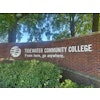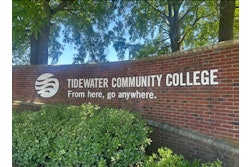T Dr. DeRionne PollardAACC
Dr. DeRionne PollardAACC
"Resilient by Design", commissioned by AACC's Board of Directors and conducted by the National Center for Higher Education Management Systems (NCHEMS), identifies evolving technology, shifting political climates, and growing workforce demands as critical forces requiring institutional transformation.
"Our colleges are being called to navigate seismic demographic shifts, economic realignments, political divides, and the accelerating influence of technology," said Dr. DeRionne Pollard, AACC's president and CEO. "In these challenges lies an extraordinary opportunity: to reimagine how community colleges serve students and society, and to lead transformation across the higher education landscape."
The report emerges as community colleges face sustained enrollment decline and intensifying competition. National two-year college enrollment has fallen by more than two million students from its 2010 peak, while high school graduates are projected to begin a long-term decline after 2025.
Dr. Leigh Goodson, AACC's board chair and president of Tulsa Community College, called attention to the urgency of the findings.
"The rapid and continuous pace of the external changes that we all face requires us to consider new ways of responding," Goodson said. "The board of directors recognized the urgency of identifying the influences and, more importantly, ways in which we can rethink how we react to those changes with resilience and innovation."
The report outlines several critical imperatives for community college leaders:
Expanding Leadership Capacity: Presidents and senior administrators must now function as fundraisers, policy navigators, cultural change agents, and data-informed strategists simultaneously. The report acknowledges that leadership can no longer rest with a single individual but must become "a team sport."
Innovating Business Models: Colleges must adopt strategic budgeting practices, reimagine traditional business models, and demonstrate return on investment not only to funders and policymakers but directly to students and communities. The report positions community colleges as engines of economic vitality and social mobility that must advance both immediate workforce needs and long-term wealth-building for students.
Deepening Policy Engagement: While federal advocacy remains essential, the report emphasizes that state and regional policy increasingly shapes the daily realities of community college operations. AACC plans to provide members with state-level resources, legislative templates, and partnerships to support effective advocacy.
Transforming Employer Engagement: The report calls for employer partnerships that go beyond advisory roles to co-designing curricula, offering meaningful work-based learning, and ensuring graduates secure family-sustaining wages leading to long-term careers.
NCHEMS researchers conducted 48 interviews with 57 individuals—including community college leaders, business representatives, researchers, and policy experts—and surveyed 55 AACC board members and affiliated leaders to develop the report's findings.
The report also addresses artificial intelligence as a transformative force, noting that 94% of U.S. firms expect AI and information processing technologies to transform their operations between 2025 and 2030. Community colleges must integrate AI literacy across programs while deploying the technology to improve operations and personalized learning.
"This report arms presidents with an environmental context and framework to use within their organizations and communities for redesign and transformation," Pollard said. "While the work needed is urgent, the opportunities will benefit the colleges and the sector for generations to come."
AACC plans to develop toolkits and resources in the coming weeks to help community colleges assess external factors impacting their programs and services and guide them in creating innovative solutions.
The report emphasizes that while community colleges serve diverse communities with varying needs, all institutions must prioritize demonstrating measurable value, adapting to changing student populations, and accelerating responsiveness to workforce demands.
"The report itself helps to contextualize the myriad forces that impact our colleges and a call to action for college leaders to become the architects of success models for students and institutions," Pollard said.















